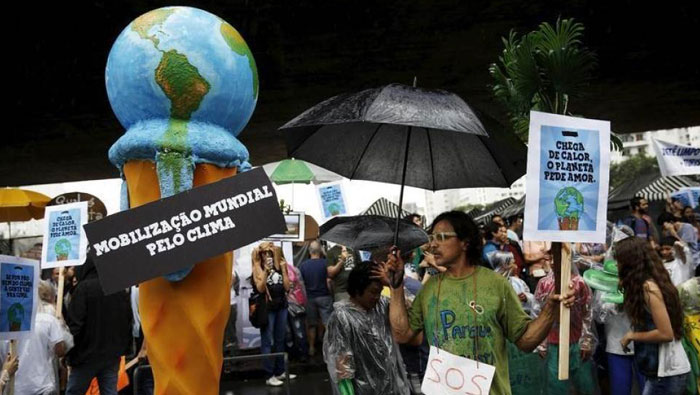
Brasilia: As at least 130 countries prepare to sign the Paris climate agreement in New York later this month, environmental experts have warned that enthusiasm for climate change action may be waning in Brazil.
The political and economic crises now rocking the Latin American heavyweight could undermine the key role played by Brazil in shaping the new international deal to curb global warming, they say.
"It is very clear that the federal government is struggling for its political survival. As a consequence, the climate change agenda is frozen," said Carlos Rittl, executive secretary of the Climate Observatory, a Brasília-based coalition of 35 nongovernmental groups.
President Dilma Rousseff faces charges of breaking budget laws to support her re-election in 2014. This week, a committee of the lower house of Congress recommended her impeachment, with a vote in the full lower house expected on Sunday.
Meanwhile, Brazilians are grappling with a major corruption scandal over a kickback scheme at state-run oil company Petrobras, and hard times after a decade of prosperity. The economy suffered its worst slump for a quarter of a century last year and unemployment is rising.
Brazilian diplomats are expected to attend the UN signing ceremony for the Paris climate deal on April 22. But there are growing concerns the country's woes could thwart efforts to meet the pledges made in its contribution to the global agreement reached in December.
Brazil has set a target to cut its carbon emissions 37 per cent from 2005 levels by 2025, and has indicated an "intended reduction" of 43 per cent by 2030.
Brazil is among the 188 countries that have submitted climate action plans as part of an international effort to limit global average temperature rise to well below 2 degrees Celsius.
But Brazil's contribution will only become law when Congress ratifies the Paris Agreement.
With discussion among parliamentarians focused on the president's impeachment, it is highly likely the Paris deal ratification will take longer than it should, Rittl said.
Nonetheless, Brazilian Climate Change Secretary José Miguez believes Congressional approval will come in the next five years, based on the time Brazil took to ratify the Kyoto Protocol, the existing international treaty to curb global warming.
Negotiated in 1997, it was ratified by Brazil in 2002 and entered into force in 2005.
At that time, Brazil had no targets to pursue, as the Kyoto Protocol binds only developed countries to cut emissions.
"The situation regarding climate change nowadays is much more serious - so there is far more awareness among the parliamentarians than there was back in 2002," said Miguez.
It is not necessary to wait for Congress to ratify the Paris agreement before kick-starting action, he added, as business was involved in government discussions on the UN plan for two years before it was submitted.
"The agriculture, energy and industry sectors have begun to adapt in order to cut their emissions," he said.
Rittl warned, however, that falling investment in programmes such as low-carbon agriculture and wind power - due to the economic slowdown - could have a harmful impact.
Still there are reasons to believe Brazil will stick to its climate pledges despite the political and economic storm clouds, said Jacques Marcovitch, professor and former president of the University of So Paulo.
"Before going to Paris, Brazil signed bilateral agreements with the United States and Germany. These are very strong environmental accords and indicate the country is committed to fulfilling its goals," he said.
For Brazil to meet those goals, the agricultural sector will have to act, said Gustavo Junqueira, president of the Brazilian Rural Society. Agriculture is responsible for 37 per cent of Brazil's carbon emissions, the same as the energy sector.
Compliance with the Forest Law would help reduce farming emissions, Junqueira added. It is also key to meeting another goal in Brazil's UN climate plan: to eliminate illegal deforestation by 2030.
The legislation to protect forests, modified amid controversy a few years ago, establishes a proportion of rural land that must be maintained as forest depending on the region.
In the Amazon biome, for example, where demand for beef and animal feed has fuelled an increase in deforestation, landowners have to set aside 80 per cent of forests as a natural reserve.
While the forest code was approved in 2012, there are ongoing challenges to its implementation. A deadline for mapping and registering all rural properties had to be extended to May 2016, for example.
A study released last year by a consortium of Brazilian and international research institutes concluded that implementing the forest code would bring about a major reduction in Brazil's greenhouse gas emissions.
But forthcoming research argues it will not be enough.
Andréa Azevedo, one of the authors of the study to be published soon by the Amazon Environmental Research Institute (IPAM), said deforestation would have to be cut by 87 per cent to meet Brazil's 2025 emissions goal, and reduced to zero by 2030.
But a lack of land-use planning threatens that, she added.
"We see large land owners clearing forest areas to make a plantation next year without knowing for sure whether that area will be needed. And this has an impact on carbon emissions," she said.
According to official data, emissions from deforestation fell from 58 per cent of Brazil's total emissions in 2005 to 15 per cent in 2012.
Brazil has also committed to restore 12 million hectares (29.7 million acres) of land by 2030, but has yet to put together a clear plan for this, while it is unclear how it would directly affect agriculture.
A recent survey by Brazil's Instituto Escolhas said the reforestation plan would cost around $14 billion (52 billion reais).
"It is like restoring the entire area of England - removing all the buildings and turning everything into forest," said Sérgio Leitão, co-founder of the institute. "We are already late if we want to accomplish the goal on time."